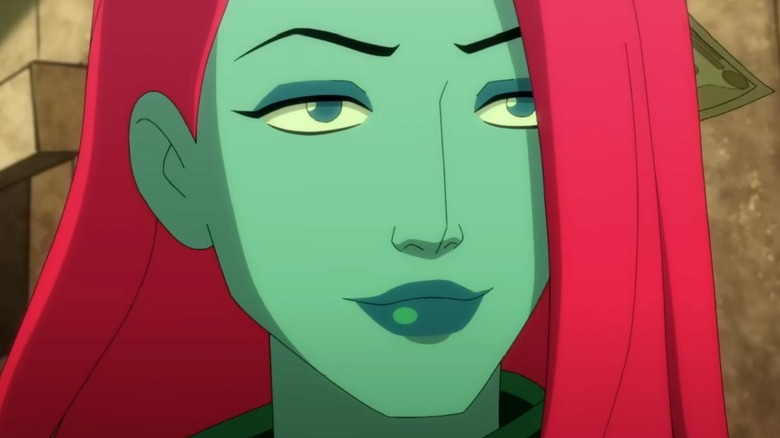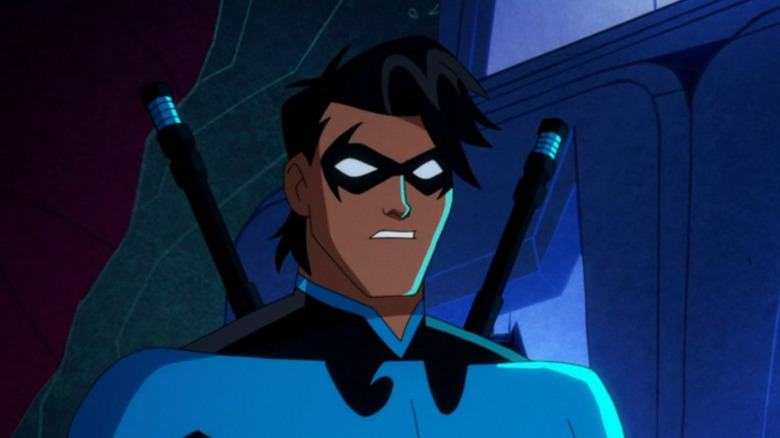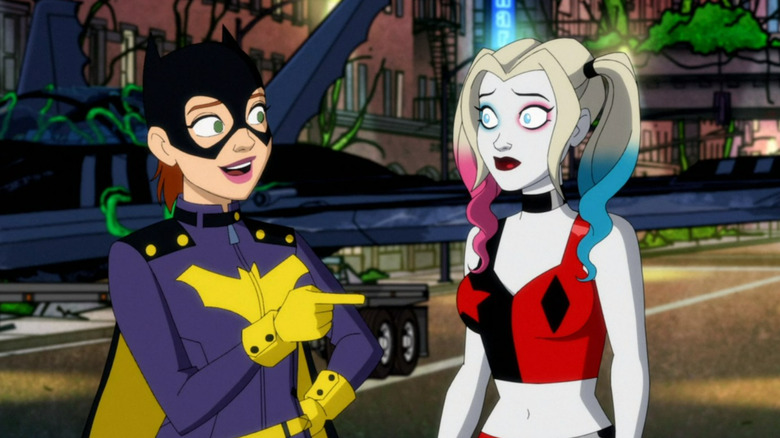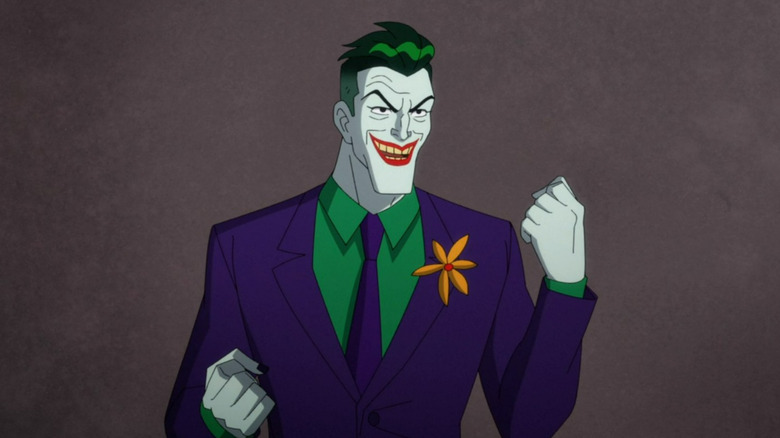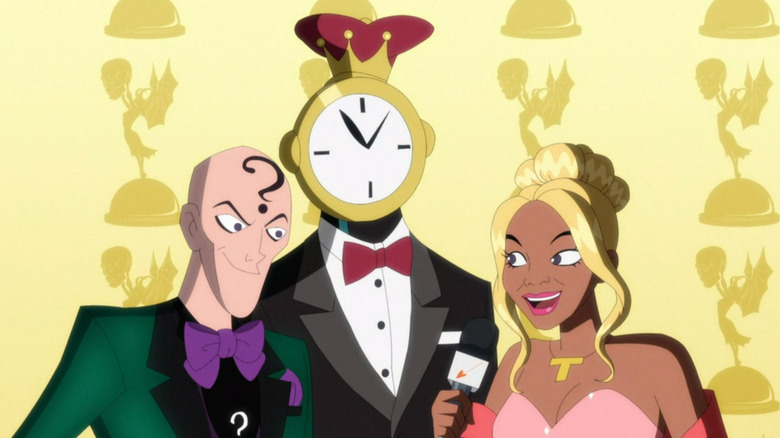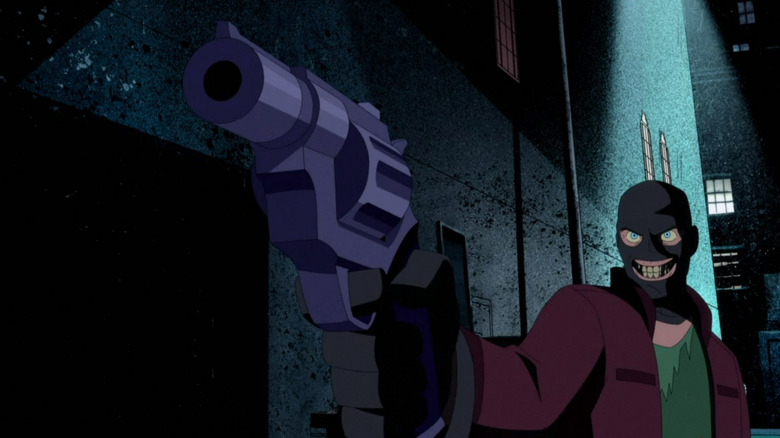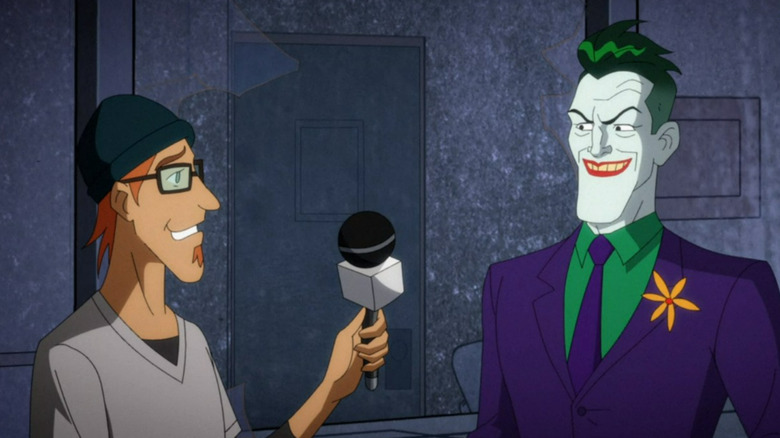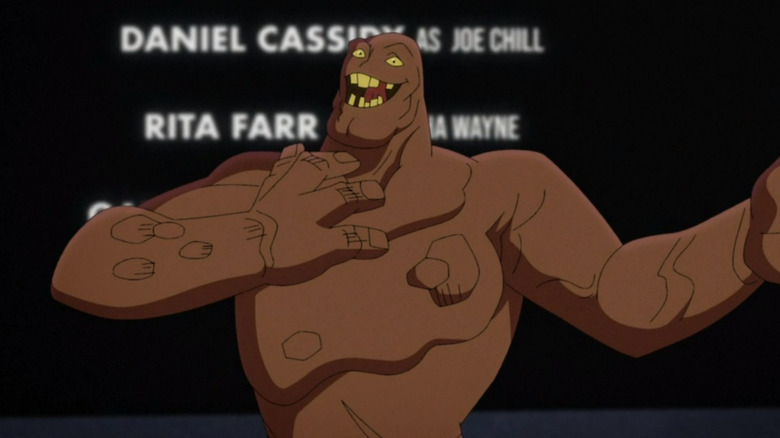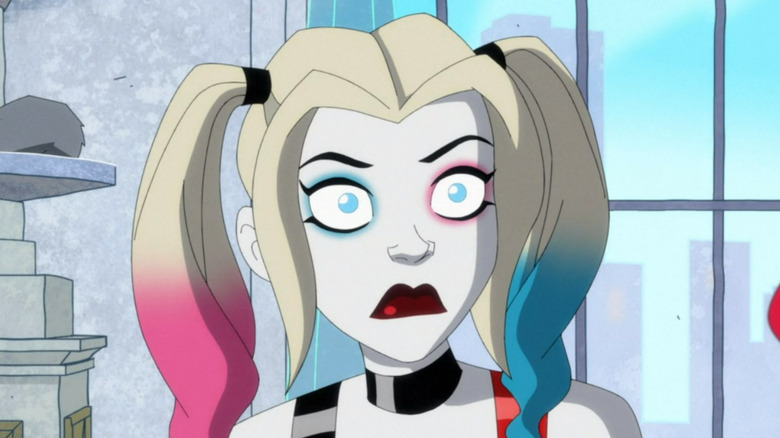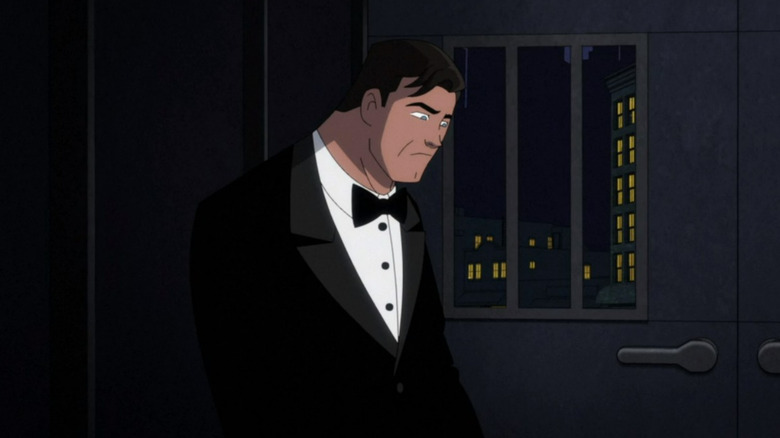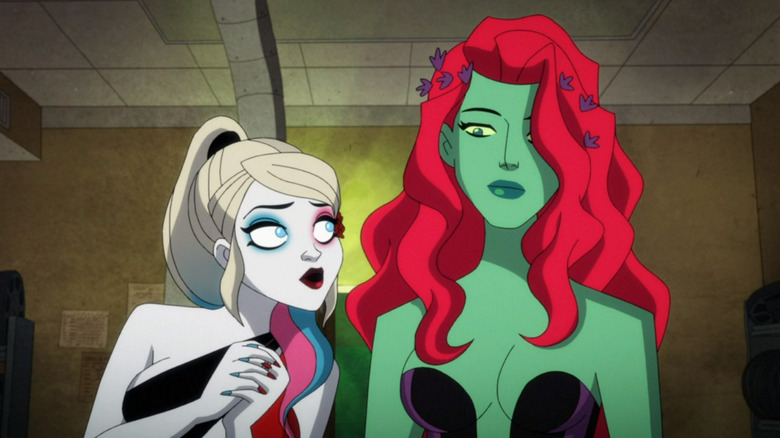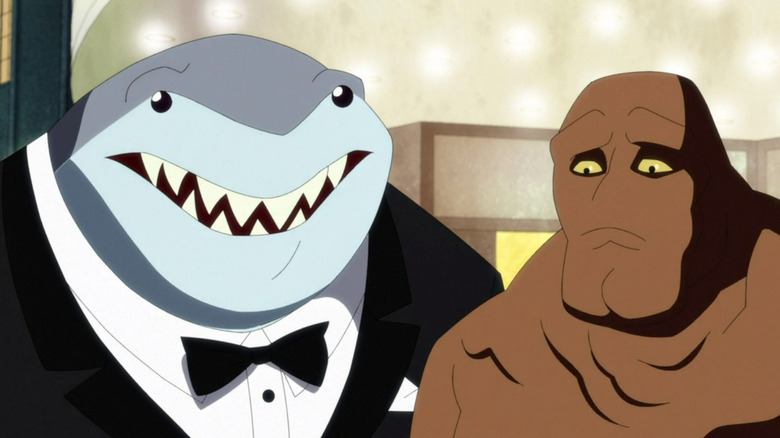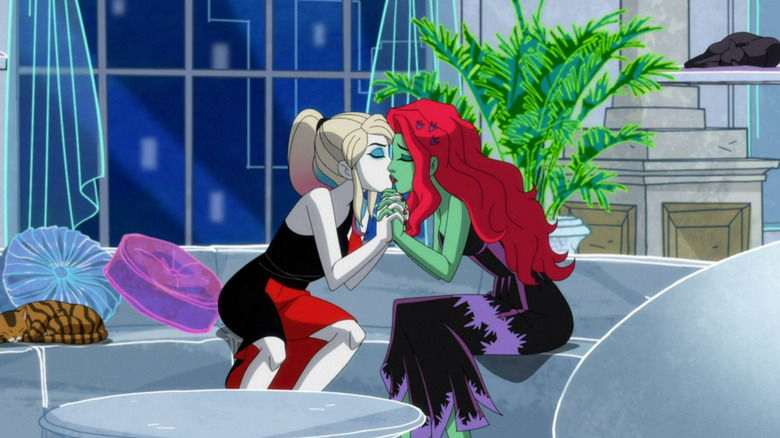The 6 Best And 6 Worst Things About Harley Quinn Season 3
"Harley Quinn" Season 3 continues the HBO Max animated series' irreverent trek through the DC universe. Led once again by spectacular performances from Kaley Cuoco as Harley and Lake Bell as Poison Ivy, the show delivers more of the ruthless parody, bloody action, and poignant moments that fans have come to expect. However, "Harley Quinn" also grows substantially in Season 3, finding a greater sense of identity and pushing the boundaries of what it can accomplish within the world of Gotham City.
Of course, the most obvious change right out of the gate in Season 3 is that Harley and Ivy are finally together. This isn't just some asterisk on the story, but its central pillar. Most of the episodes in Season 3 revolve around the couple as they navigate their new relationship, emotional vulnerability, and conflicting personal goals. Don't worry, though — it's still as funny as you remember.
This balancing act of blending heartfelt personal arcs with the absurdist backdrop of the DC universe has always made "Harley Quinn" stand out. And in Season 3, that balance is struck better than ever before. It's an equally compelling and hilarious set of episodes, but that doesn't mean that some things couldn't be improved going forward. Here are the best and worst things about "Harley Quinn" Season 3.
Worst: The typical adult cartoon humor
When "Harley Quinn" first debuted on the short-lived DC Universe streaming platform back in 2019, it was a pretty simple pitch: What if Harley dumped the Joker to focus on ultraviolence and self-growth? In Season 1, the show reads approximately as "Archer" with Batman, complete with all the comedic stylings of the adult cartoon genre. That's not innately a bad thing, and a lot of the more traditional humor in "Harley Quinn" has hit over the years. But now that the show has transformed into something more unique, the remnants of that more juvenile humor feel out of place.
Commissioner Gordon is a great example of this. He's been a one-note character for the entire show — a walking trope whose identity is 50% drinking in shame and 50% being divorced. While there's definitely comedic value in sending up classic "Batman" characters, the joke gets old about halfway through Season 1. Gordon thankfully doesn't get as much screen time in Season 3, but his cardboard characterization lives on in both Batman and Nightwing.
This repetitive reliance on comically sad and flat characters feels directly pulled from the Sterling Archer playbook and the Justin Roiland renaissance. The problem isn't that the jokes don't land in "Harley Quinn" (the Batman characterization feels particularly apt), but that it just does so much better elsewhere. The show has grown beyond this kind of humor in so many ways, but it hasn't fully shed it yet.
Best: Absurdist sitcom stylings
Thankfully, for every lackluster joke in "Harley Quinn" Season 3, there are a dozen good ones. Curiously enough, most of those come from the more mundane parts of the story — the moments when Harley and Ivy are allowed to be normal people with normal problems, while also being, you know, supervillains. The show has always had something of a sitcom style to it, with Harley and Ivy's roommate dynamic mirroring shows like "Broad City" and "2 Broke Girls." The difference, of course, is that instead of waiting tables, they're trying to take over Gotham with prehistoric plants.
With Harley and Ivy finally together in Season 3, the less fantastical parts of the show are given even more room to breathe. Yes, it's funny when the show goes full comic book by diving into people's brains or making minor zombie outbreaks. But it's even funnier to see Harley repeatedly try and fail to get a beignet, or to see her form a heavy metal band with Clayface and King Shark.
"Harley Quinn" is at its best when the comic book storylines serve as the backdrop, rather than the main attraction. Everyday issues like roommate problems and running into your ex are made hilarious because the characters and stakes are so ridiculous. Season 3 dives deeper than ever before into this absurdist sitcom space, and the result is the best outing the show has had yet.
Worst: The songs
Many famous comedians have used music as a primary medium. From stand-up comics like Bo Burnham to TV writers like Matt Stone and Trey Parker, the comedy song has been used well by many. "Harley Quinn" Season 3 dips its toes into the realm of musical comedy several times, but unfortunately, the results are more distracting than entertaining.
To be fair, this is a pretty small issue. There are only a handful of songs in Season 3. But because so much of the show's writing is so great, the less stellar moments stick out like sore thumbs, and that's sadly the case with the various comedy songs sprinkled across the 10 episodes. From Joker's Villie Awards intro song "Like Joker Do" (which is bafflingly referenced repeatedly throughout the rest of the season) to Batman and Catwoman's forced therapy singalong, the musical ventures just feel cringey and flat. They're too sincere to work ironically, and they're not clever enough to work unironically. Even the retro sitcom theme song to "Joker: The Killing Vote," which is funny in concept, winds up being an awkward amalgam of "Dark Knight" references.
Again, this is a minor issue. There aren't enough songs for their lackluster quality to be a huge drag, but there are enough that you're constantly reminded what the writers are and aren't good at. The people penning the show are so good at so many things that the musical outings feel like unnecessary distractions every time.
Best: Perfect parody
"Harley Quinn" Season 3 focuses more on character arcs and personal stories than the two previous seasons, but that doesn't mean that it abandons parody altogether. The DC universe send-ups in the third season are smarter and funnier than ever, delivering plenty of laughs alongside the show's more heartfelt moments.
Doctor Psycho starts a therapy podcast in prison. The Joker's anti-establishment persona turns him into a socialist. Swamp Thing turns out to be a tea-sipping hippie. And the Court of Owls stops its living sacrifices by popular demand, focusing instead on hosting orgies. All these jokes land because they only exaggerate what's already there, caricaturing the bizarre nature of the DC universe to spectacular effect.
Comic book weirdness isn't the show's only target in Season 3. Everyone from the super rich to the Hollywood Foreign Press Association get sufficiently mocked, all with the sharp and witty writing that's become the series' trademark. "Harley Quinn" continues to prove that you don't have to sacrifice comedy in order to tell a compelling story.
Worst: Recycling
When "Harley Quinn" Season 3 is at its best, it feels fresh and unique. The storylines involving Harley, Ivy, and the Joker are particularly entertaining, as they take the familiar characters in interesting new directions. Unfortunately, that kind of originality and ingenuity isn't as common in other corners of the show. Clayface still drops niche jokes about being a pretentious actor, King Shark still does kingly shark stuff, and a lot of episodes still involve infiltrating hideouts and running down corridors.
To some extent, that's the point. "Harley Quinn" uses the tropes and formats of previous DC animated shows in order to spoof them. But when so much of the show feels new and interesting in Season 3, these repetitive bits stand out more. In some ways, it feels like it's outgrown itself, and that's apparent in more than just the occasional bits of repetitive writing. Three seasons in, and we're still listening to the same three backing tracks — one for when there's action happening, one for when things get kooky, and one for the emotional moments. It's not uncommon to hear these same three tracks cycle numerous times in a single episode. Obviously, musical scoring isn't the priority in an animated comedy about two queer supervillains, but it's the kind of thing you can't help but notice this deep in.
Best: Trying new things
While there is some unevenness in "Harley Quinn" Season 3, the highs are high enough that the lows rarely matter. The supporting characters and B-plots might recycle previous seasons a bit too much, but the core arcs bring the thunder and the laughs with a lot of fresh new material.
After seeming unsure about what exactly to do with the Joker in "Harley Quinn" Season 2, Season 3 gives him an arc that's brilliantly strange and mundane at the same time. Seeing Gotham's Clown Prince of Crime elected the city's mayor would be unthinkable in pretty much any other "Batman" story, but here it feels like the next natural step in the character's chaotic arc. It's fun to see Harley putting her therapy skills to work helping Batman unpack his childhood trauma. And, of course, the whole season adopts a wonderfully different, even joyful tone as Harlivy takes centerstage.
"Harley Quinn" Season 3 takes these character dynamics and puts them in position to thrive. Episodes like "The 83rd Annual Villy Awards," "Joker: The Killing Vote," and "Batman Begins Forever" are creative and memorable — not because they're the most bombastic or zany episodes, but because they put the core characters in new and entertaining situations. Not every outing is a homerun, but there are a lot of great ones.
Worst: Uneven pacing
Pacing in a show like "Harley Quinn" is a difficult thing. You have to keep the comedy flowing, while at the same time pushing the character arcs forward and developing the big-picture storylines. Season 3 smartly slows things down to focus on Harley and Ivy's relationship, but that slower pace doesn't work quite as well when applied to the show's other subplots.
While the core "Harley Quinn" characters are given lots of room to grow and develop in interesting ways, the supporting cast still largely consists of less complex cartoon characters. King Shark, Clayface, and Robin can be funny characters when accessorizing a zany comic book adventure, but in the more modestly paced "Harley Quinn" Season 3, they start to feel underdeveloped. Nora Freeze arguably gets more meaningful growth in Season 3 than any of those three characters, simply because she accompanies Harley and Ivy on one of their voyages.
In the past, "Harley Quinn" has made its less complex characters work because they're always involved in some evil scheme or another. Their flatness doesn't really matter in the context of antics and high stakes. But in Season 3, with everything slowed down, some of those characters' subplots start to feel a bit dull.
Best: Heart
Comedy can still carry powerful messages, and "Harley Quinn" is proof of that. Since the beginning, it's been a show that uses absurdism to discuss real, relatable issues, and Season 3 excels particularly in that department.
Where Season 1 and Season 2 are stories about learning to love yourself, Season 3 is a story about pursuing your dreams. That might sound hokey for a DC cartoon with tree zombies, but it plays impressively well. For the first time since becoming a villain, Harley starts to really reflect on what she wants out of her life. Not what the Joker would want, or what the world of villainy expects, but what she as an individual wants to do. By the end of the season, she's roaming the streets with the Bat Family — a far cry from her typical tendencies. She might not stay a crimefighter forever, but it's genuinely satisfying to see her trying something new simply because she wants to.
Poison Ivy has a similar arc. After hanging out on the couch and being Harley's support system for two seasons, she gets reinvigorated to bring about her eco-utopia on Earth. It's actually quite touching to see Harley and Ivy navigate their conflicting ambitions in the context of their relationship, and they aren't the only ones to get heartfelt moments in Season 3. Joker continues to embrace his family life, and Batman starts to address his untreated trauma.
Worst: Too much Batman?
After being little more than set dressing for the first two seasons of "Harley Quinn," Batman takes on a much bigger role in Season 3. He gets a whole episode dedicated to his childhood trauma, complete with references to the Adam West, Tim Burton, and Christopher Nolan eras. He gets a romance plotline of sorts via his relationship with Catwoman. The whole Bat Family plays a major role in Season 3, and in the finale, Bruce Wayne is arrested for Tax fraud. All in all, it's a pretty eventful 10 episodes for Gotham's favorite billionaire.
Some of that material is really great. It's fun to see Harley's psychology training being used to help Bruce, and it's nice to have a major DC show that directly acknowledges some of Batman's more questionable traits. But, more often than not, Batman plays the same way he always has in the show — as a joked-up caricature whose main recurring bit is being depressed.
To be fair, Bruce does seem to be on a path toward self-improvement by the end of "Harley Quinn" Season 3. But for most of it, he's an echo of jokes the show has already made. He doesn't understand rent or know how to make food, but he's still supposed to be the heroic Batman who comic book fans have come to know and love. This balance just feels a bit off given how much screen time the Caped Crusader gets.
Best: A tighter focus
Perhaps the most compelling thing about "Harley Quinn" Season 3 — aside from the relationship at its core — is how intentional most of the episodic plotlines feel. Everything is connected in a much greater way than what the previous two seasons offered, and the climax is richer as a result.
While some storylines are more interesting than others, they all play into the greater whole. Clayface's acting aspirations lead him to the set of James Gunn's Thomas Wayne biopic, which itself ends up triggering some depressive reactions from Bruce Wayne. That sadness is magnified by his breakup with Catwoman, which itself adds some drama to Harley and Ivy's dynamic. All this drives Bruce to enact a crazy scheme to resurrect his dead parents, accidentally giving Ivy the exact tools she needs to take over Gotham. It all culminates at the premiere of "A Hard Wayne's Gonna Fall," which brings everything together in a much more subtle and satisfying way than a big action climax could have.
Overall, the writing in "Harley Quinn" Season 3 just feels more intentional than in the previous seasons. There's no big external villain — just a core cast of characters who have to deal with their own issues to move forward. With Doctor Psycho and Kite Man relegated to guest roles and several of the show's past villains now dead, Season 3 has fewer characters to focus on, and it makes the most of the extra space.
Worst: No material for the sidekicks
Ron Funches and Alan Tudyk have been great as King Shark and Clayface since the start of "Harley Quinn," and they continue to be great in Season 3. Unfortunately, the writing their characters get doesn't really keep up with the quality of the performances. More often than not, Season 3 seems uncertain what to do with Harley's two sidekicks, which is unfortunate given how hilarious they still are.
That's not to say that they don't still get some material. Clayface's masquerade as Billy Bob Thornton (undertaken after accidentally killing the actor) is entertainingly meta, and King Shark gets one of the show's most complex fight scenes ever when he duels his brother for the shark throne. But these side plots aren't positioned as anything more than brief distractions — filler to set up more interesting moments and bide time while Harley and Ivy are off screen.
Part of the issue may be that without Doctor Psycho and Kite Man, the crew dynamic of Season 1 and Season 2 isn't really present anymore. Clayface and King Shark were originally written as members of a larger ensemble, all of whom were secondary to Harley, Ivy, and the Joker. But with several of those supporting characters cast out, the remaining two feel stuck. They don't do much with Harley because her arc takes her elsewhere, but they also don't get enough promotion to make them more than comic relief characters.
Best: Harlivy
There's no question what the central attraction in "Harley Quinn" Season 3 is. After getting together at the end of Season 2, Harley and Ivy pick up right where they left off. Most of the season revolves around their new relationship, showing the mundane and the everyday as well as the comically absurd. The series really becomes a romance in Season 3, but it does so without sacrificing the things that made the characters lovable to begin with.
Balancing your professional goals with those of your partner; setting boundaries in your living space; supporting the person you love without being overbearing — these are the big challenges at the core of "Harley Quinn" Season 3. Not only does the show allow its two leads to be happy together, but it uses their relationship to make each of their individual character arcs even more compelling.
"Harley Quinn" Season 3 covers a lot of ground. It's a show about facing your demons, embracing change, and becoming the person you really want to be. But more than anything, it's a show about how accepting love can help you reach new peaks. Harley and Ivy learn that lesson together, and in the process they deliver the best season that "Harley Quinn" has had yet.
